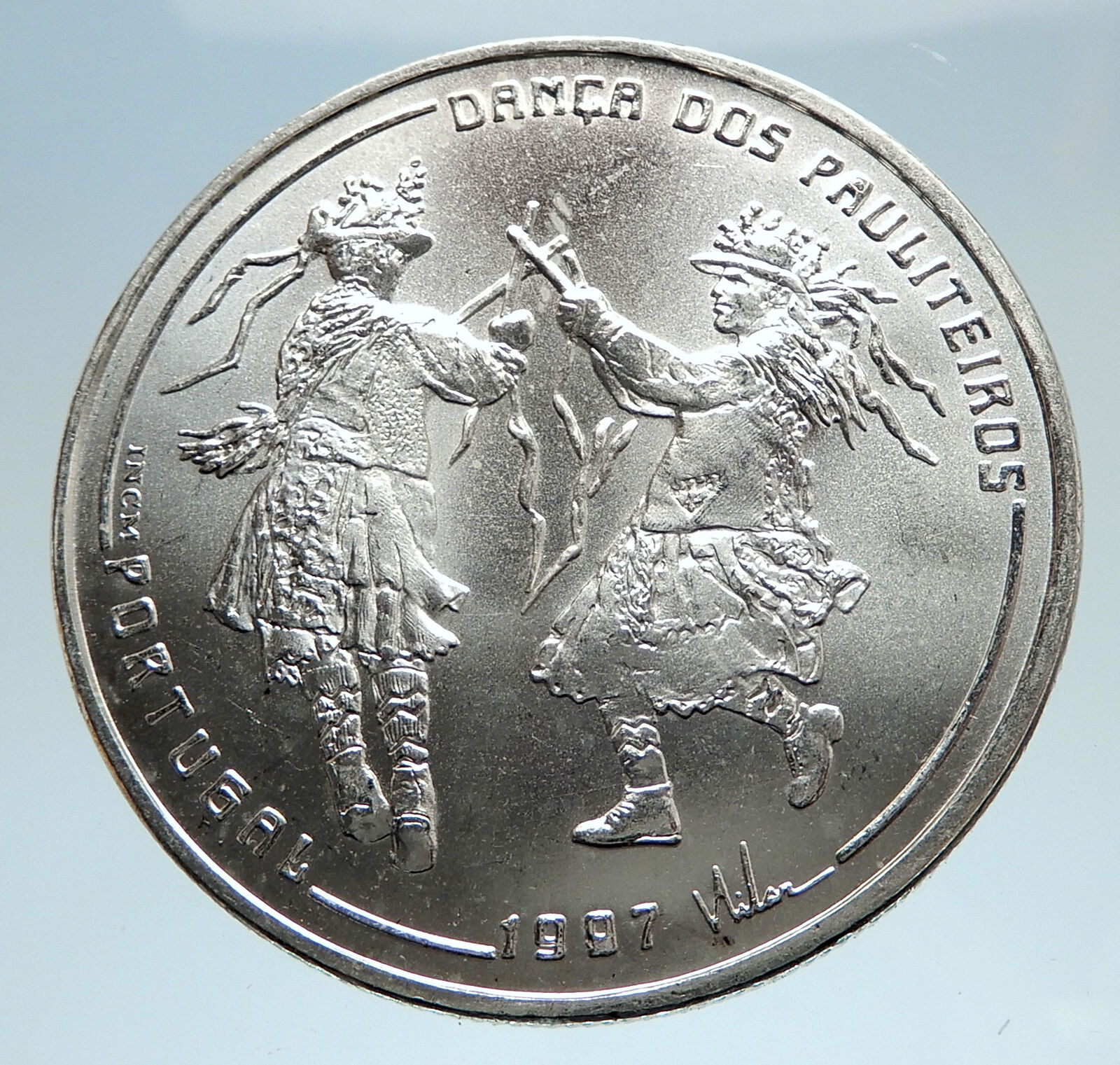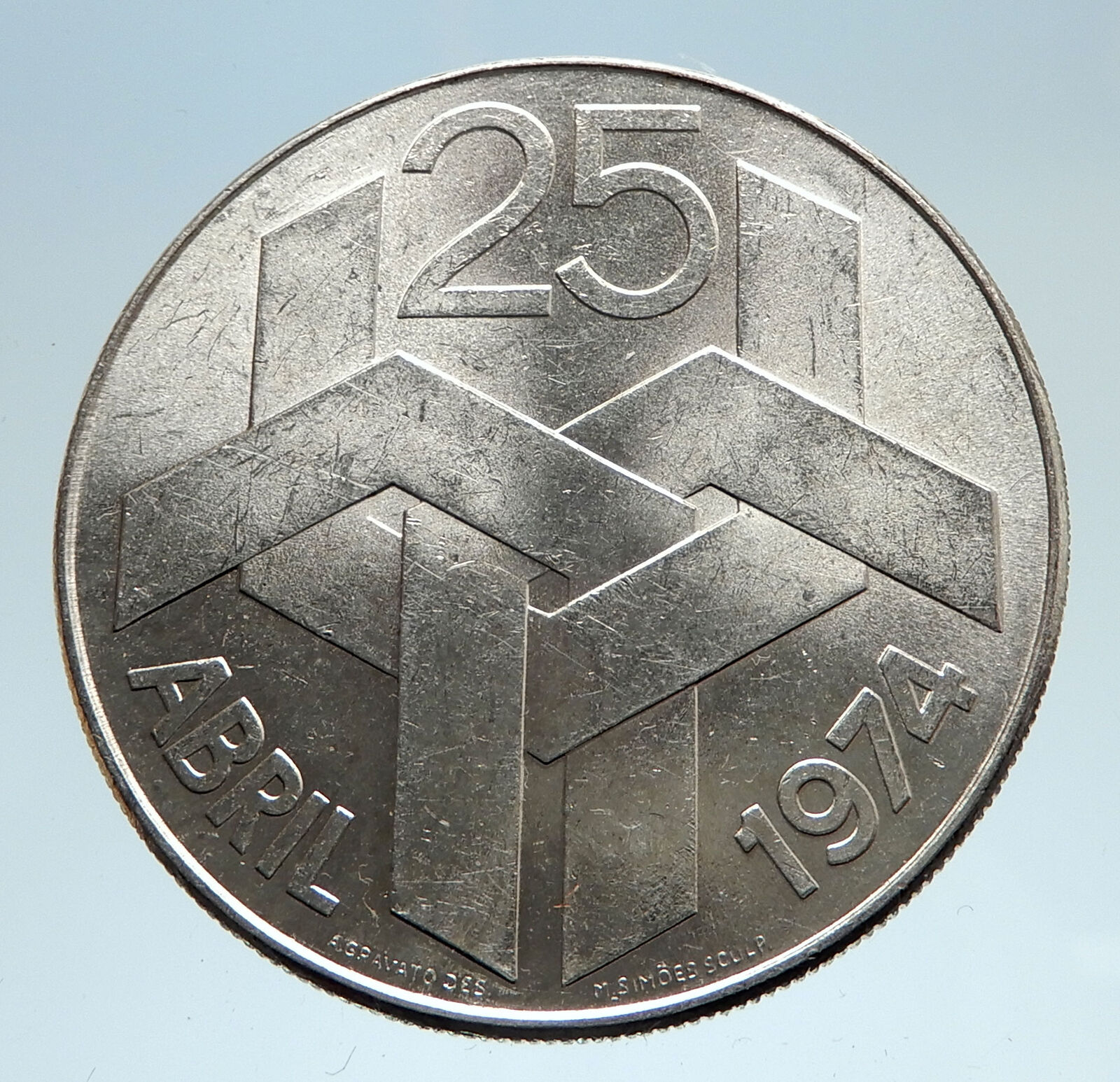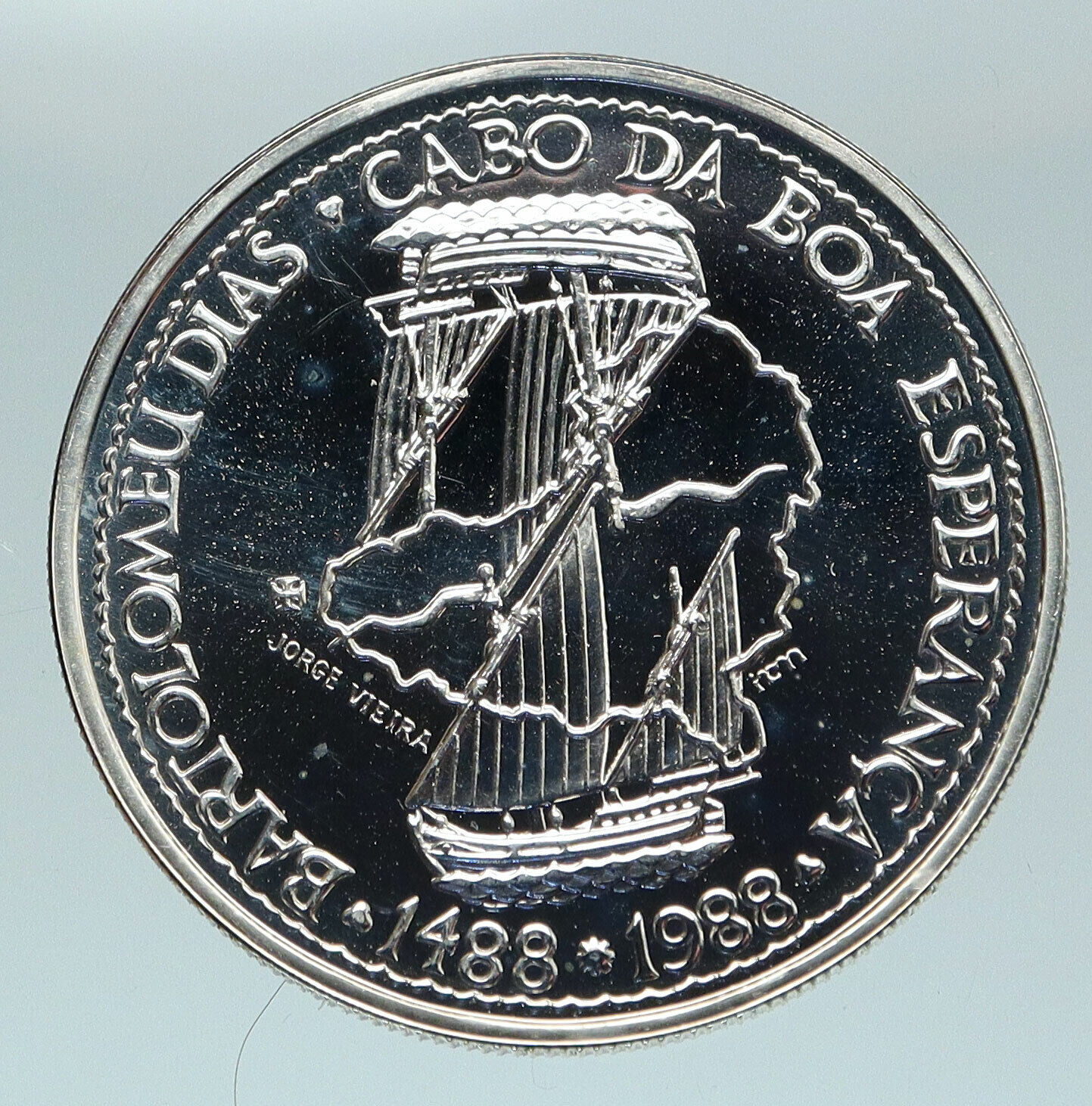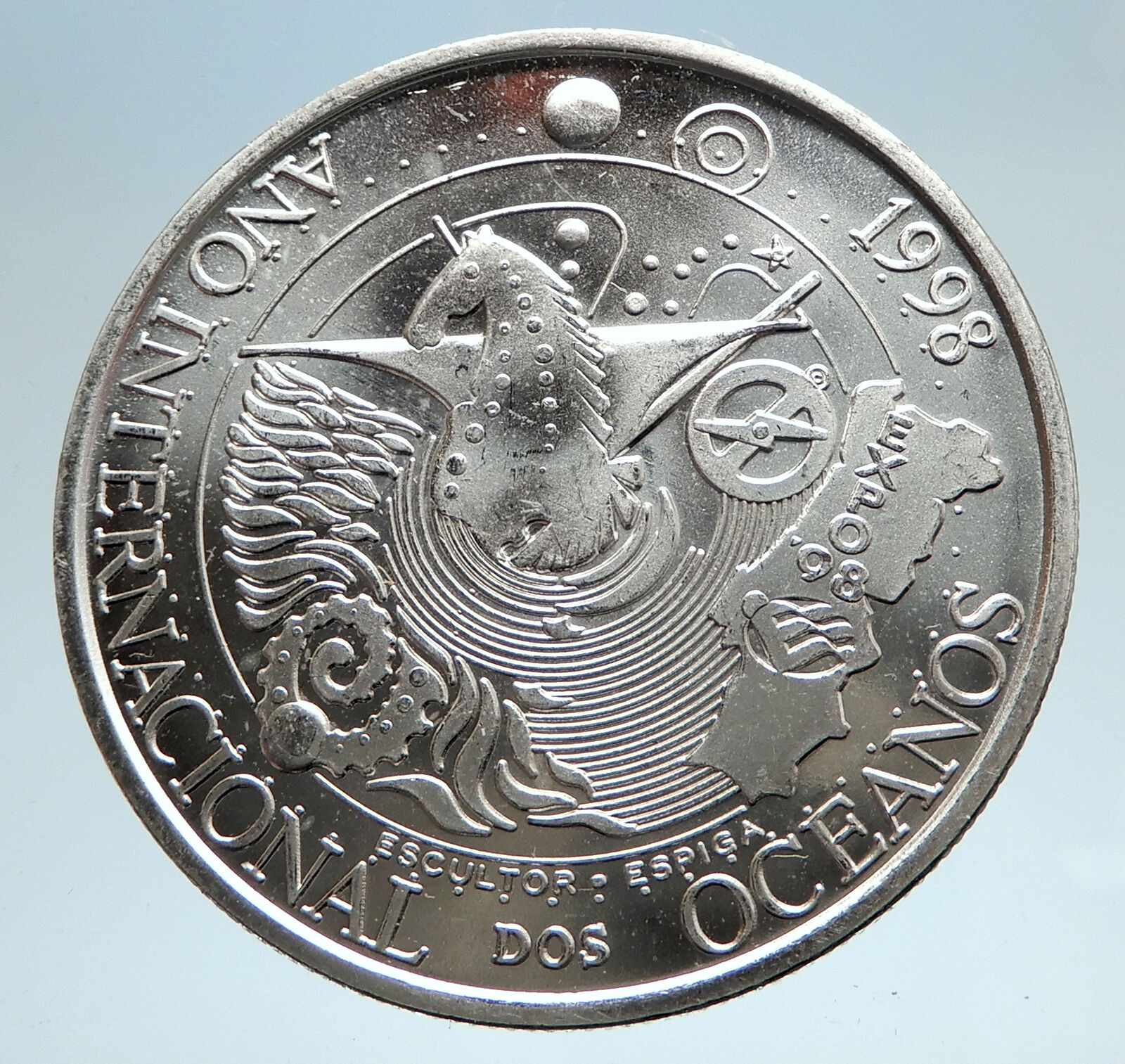|
Portugal
300th Anniversary of the Death of Father António Vieira
1997 Silver 500 Escudos 30mm (14.03 grams) 0.500 Silver (0.2251 oz. ASW)
Reference: KM# 701, Gomes# R 146.01 | Engraver: Helder Batista
REPÚBLICA PORTUGUESA . 500$00 ., Shield superimposed on radiant sun.
III CENTENÁRIO DA MORTE 16/997 PADRE ANTÓNIO VIEIRA, INCM H. BATISTA, Vieira facing 1/2 left.
You are bidding on the exact item pictured, provided with a Certificate of Authenticity and Lifetime Guarantee of Authenticity.
 Father António Vieira (6 February 1608 – 18 July 1697) was an Afro-Portuguese Jesuit priest, diplomat, orator, preacher, philosopher, writer, and member of the Royal Council to the King of Portugal. Father António Vieira (6 February 1608 – 18 July 1697) was an Afro-Portuguese Jesuit priest, diplomat, orator, preacher, philosopher, writer, and member of the Royal Council to the King of Portugal.
Vieira was born in Lisbon to Cristóvão Vieira Ravasco, the son of a mulatto woman and Maria de Azevedo. In 1614 he accompanied his parents to the colony of Brazil, where his father had been posted as a registrar. He received his education at the Jesuit college at Bahia. He entered the Jesuit novitiate in 1625, under Father Fernão Cardim, and two years later pronounced his first vows. At the age of eighteen he was teaching rhetoric, and a little later dogmatic theology, at the college of Olinda, besides writing the “annual letters” of the province.
In 1635 he entered the priesthood. He soon began to distinguish himself as an orator, and the three patriotic sermons he delivered at Bahia (1638–40) are remarkable for their imaginative power and dignity of language. The Sermon for the Good Success of the Arms of Portugal Against Those of Holland was considered by the Abbé Raynal to be “perhaps the most extraordinary discourse ever heard from a Christian pulpit.
When the revolution of 1640 placed John IV on the throne of Portugal, Brazil gave him her allegiance, and Vieira was chosen to accompany the viceroy’s son to Lisbon to congratulate the new king. His talents and aptitude for affairs impressed John IV so favorably that he appointed him tutor to the Infante Dom Pedro, royal preacher, and a member of the Royal Council.
Vieira did efficient work in the War and Navy Departments, revived commerce, urged the foundation of a national bank and the organization of the Brazilian Trade Company.
Vieira used the pulpit to propound measures for improving the general and particularly the economic condition of Portugal. His pen was as busy as his voice, and in four notable pamphlets he advocated the creation of companies of commerce, denounced as unchristian a society which discriminated against New Christians (Muslim and Jewish converts), called for the reform of the procedure of the Inquisition and the admission of Jewish and foreign traders, with guarantees for their security from religious persecution. Moreover, he did not spare his own estate, for in his Sexagesima sermon he boldly attacked the current style of preaching, its subtleties, affectation, obscurity and abuse of metaphor, and declared the ideal of a sermon to be one which sent men away ” not contented with the preacher, but discontented with themselves.”
In 1647 Vieira began his career as a diplomat, in the course of which he visited England, France, the Netherlands and Italy. In his Papel Forte he urged the cession of Pernambuco to the Dutch as the price of peace, while his mission to Rome in 1650 was undertaken in the hope of arranging a marriage between the heir to the throne of Portugal and the only daughter of King Philip IV of Spain. His success, freedom of speech and reforming zeal had made him enemies on all sides, and only the intervention of the king prevented his expulsion from the Society of Jesus, so that prudence counselled his return to Brazil.
In his youth he had vowed to consecrate his life to the conversion of the African slaves and native Indians of his adopted country, and arriving in Maranhão early in 1653 he recommenced his apostolic labors, which had been interrupted during his stay of fourteen years in the Old World. Starting from Pará, he penetrated to the banks of the Tocantins, making numerous converts to Christianity and European civilization among the most violent tribes; but after two years of unceasing labour, during which every difficulty was placed in his way by the colonial authorities, he saw that the Indians must be withdrawn from the jurisdiction of the governors, to prevent their exploitation, and placed under the control of the members of a single religious society.
Accordingly, in June 1654 he set sail for Lisbon to plead the cause of the Indians, and in April 1655 he obtained from the king a series of decrees which placed the missions under the Society of Jesus, with himself as their superior, and prohibited the enslavement of the natives, except in certain specified cases. Returning with this charter of freedom, he organized the missions over a territory having a coast-line of 400 leagues, and a population of 200,000 souls, and in the next six years (1655–61) the indefatigable missionary set the crown on his work. After a time, however, the colonists, attributing the shortage of slaves and the consequent diminution in their profits to the Jesuits, began actively to oppose Vieira, and they were joined by members of the secular clergy and the other Orders who were jealous of the monopoly enjoyed by the company in the government of the Indians.
Vieira was accused of want of patriotism and usurpation of jurisdiction, and in 1661, after a popular revolt, the authorities sent him with thirty-one other Jesuit missionaries back to Portugal. He found his friend King John IV dead and the court a prey to faction, but, dauntless as ever in the pursuit of his ambition, he resorted to his favorite arm of preaching, and on Epiphany Day, 1662, in the royal chapel, he replied to his persecutors in a famous rhetorical effort, and called for the execution of the royal decrees in favor of the Indians.
Circumstances were against him, however, and the count of Castelmelhor, fearing his influence at court, had him exiled first to Porto and then to Coimbra; but in both these places he continued his work of preaching, and the reform of the Inquisition also occupied his attention. To silence him his enemies then denounced him to that tribunal, and he was cited to appear before the Holy Office at Coimbra to answer points smacking of heresy in his sermons, conversations and writings. He had believed in the prophecies of a 16th-century shoemaker poet, Bandarra, dealing with the coming of a ruler who would inaugurate an epoch of unparalleled prosperity for the church and for Portugal, these new prosperous times were to be called the Quinto Império or “Fifth Empire” (also called “Sebastianism”). In Vieira’s famous opus, Clavis Prophetarum, he had endeavoured to prove the truth of his dreams from passages of Scripture. As he refused to submit, the Inquisitors kept him in prison from October 1665 to December 1667, and finally imposed a sentence which prohibited him from teaching, writing or preaching.
It was a heavy blow for the Jesuits, and though Vieira recovered his freedom and much of his prestige shortly afterwards on the accession of King Pedro II, it was determined that he should go to Rome to procure revision of the sentence, which still hung over him though the penalties had been removed. During a six years’ residence in the Eternal City, Vieira won his greatest triumphs. Pope Clement X invited him to preach before the College of Cardinals, and he became confessor to Queen Christina of Sweden and a member of her literary academy.
At the request of the pope he drew up a report of two hundred pages on the Inquisition in Portugal, with the result that after a judicial inquiry Pope Innocent XI suspended it in Portugal for seven years (1674–81). Ultimately, Vieira returned to Portugal with a papal bull exempting him from the jurisdiction of the grand inquisitor, and in January 1681 he embarked for Brazil. He resided in Bahia and occupied himself in revising his sermons for publication, and in 1687 he became superior of the province. A false accusation of complicity in an assassination, and the intrigues of members of his own Company, clouded his last months, and on 18 July 1697 he died in Salvador, Bahia.
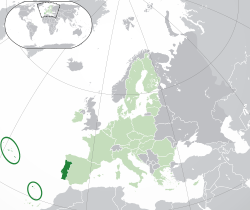  Portugal, officially the Portuguese Republic (Portuguese: República Portuguesa), is a country on the Iberian Peninsula, in Southwestern Europe. It is the westernmost country of mainland Europe, being bordered by the Atlantic Ocean to the west and south and by Spain to the north and east. The Portugal-Spain border is 1,214 km (754 mi) long and considered the longest uninterrupted border within the European Union. The republic also includes the Atlantic archipelagos of the Azores and Madeira, both autonomous regions with their own regional governments. Portugal, officially the Portuguese Republic (Portuguese: República Portuguesa), is a country on the Iberian Peninsula, in Southwestern Europe. It is the westernmost country of mainland Europe, being bordered by the Atlantic Ocean to the west and south and by Spain to the north and east. The Portugal-Spain border is 1,214 km (754 mi) long and considered the longest uninterrupted border within the European Union. The republic also includes the Atlantic archipelagos of the Azores and Madeira, both autonomous regions with their own regional governments.
 The territory of modern Portugal has been continuously settled, invaded and fought over since prehistoric times. The Pre-Celts, Celts, Phoenicians, Carthaginians and the Romans were followed by the invasions of the Visigothic and the Suebi Germanic peoples, who were themselves later invaded by the Moors. These Muslim peoples were eventually expelled during the Christian Reconquista. Portuguese nationality can be traced back to the creation of the First County of Portugal, in 868. In 1139, Afonso Henriques was proclaimed King of Portugal, thus firmly establishing Portuguese independence, under the Portuguese House of Burgundy. The territory of modern Portugal has been continuously settled, invaded and fought over since prehistoric times. The Pre-Celts, Celts, Phoenicians, Carthaginians and the Romans were followed by the invasions of the Visigothic and the Suebi Germanic peoples, who were themselves later invaded by the Moors. These Muslim peoples were eventually expelled during the Christian Reconquista. Portuguese nationality can be traced back to the creation of the First County of Portugal, in 868. In 1139, Afonso Henriques was proclaimed King of Portugal, thus firmly establishing Portuguese independence, under the Portuguese House of Burgundy.
In the 15th and 16th centuries, under the House of Aviz, which took power following the 1383-85 Crisis, Portugal expanded Western influence and established the first global empire, becoming one of the world’s major economic, political and military powers. During this time, Portuguese explorers pioneered maritime exploration in the Age of Discovery, notably under royal patronage of Prince Henry the Navigator and King João II, with such notable discoveries as Vasco da Gama’s sea route to India (1497-98), Pedro Álvares Cabral’s discovery of Brazil (1500), and Bartolomeu Dias’s reaching of the Cape of Good Hope. Portugal monopolized the spice trade during this time, under royal command of the Casa da Índia, and the Portuguese Empire expanded with military campaigns led in Asia, notably under Afonso de Albuquerque, who was known as the “Caesar of the East”.
The destruction of Lisbon in a 1755 earthquake, the country’s occupation during the Napoleonic Wars, the independence of Brazil (1822), and the Liberal Wars (1828-1834), all left Portugal crippled from war and diminished in its world power. After the 1910 revolution deposed the monarchy, the democratic but unstable Portuguese First Republic was established, later being superseded by the “Estado Novo” right-wing authoritarian regime. Democracy was restored after the Portuguese Colonial War and the Carnation Revolution in 1974. Shortly after, independence was granted to all its colonies and East Timor, with the exception of Macau, which was handed over to China in 1999. This marked the end of the longest-lived European colonial empire, leaving a profound cultural and architectural influence across the globe and a legacy of over 250 million Portuguese speakers today.
Portugal is a developed country with a high-income advanced economy and high living standards. It is the 5th most peaceful country in the world, maintaining a unitary semi-presidential republican form of government. It has the 18th highest Social Progress in the world, putting it ahead of other Western European countries like France, Spain and Italy. It is a member of numerous international organizations, including the United Nations, the European Union, the eurozone, OECD, NATO and the Community of Portuguese Language Countries. Portugal is also known for having decriminalized the usage of all common drugs in 2001, the first country in the world to do so. However, the sale and distribution of these drugs is still illegal in Portugal.
|





 Father António Vieira (6 February 1608 – 18 July 1697) was an Afro-Portuguese Jesuit priest, diplomat, orator, preacher, philosopher, writer, and member of the Royal Council to the King of Portugal.
Father António Vieira (6 February 1608 – 18 July 1697) was an Afro-Portuguese Jesuit priest, diplomat, orator, preacher, philosopher, writer, and member of the Royal Council to the King of Portugal.
 Portugal, officially the Portuguese Republic (Portuguese: República Portuguesa), is a country on the Iberian Peninsula, in Southwestern Europe. It is the westernmost country of mainland Europe, being bordered by the Atlantic Ocean to the west and south and by Spain to the north and east. The Portugal-Spain border is 1,214 km (754 mi) long and considered the longest uninterrupted border within the European Union. The republic also includes the Atlantic archipelagos of the Azores and Madeira, both autonomous regions with their own regional governments.
Portugal, officially the Portuguese Republic (Portuguese: República Portuguesa), is a country on the Iberian Peninsula, in Southwestern Europe. It is the westernmost country of mainland Europe, being bordered by the Atlantic Ocean to the west and south and by Spain to the north and east. The Portugal-Spain border is 1,214 km (754 mi) long and considered the longest uninterrupted border within the European Union. The republic also includes the Atlantic archipelagos of the Azores and Madeira, both autonomous regions with their own regional governments. The territory of modern Portugal has been continuously settled, invaded and fought over since prehistoric times. The Pre-Celts, Celts, Phoenicians, Carthaginians and the Romans were followed by the invasions of the Visigothic and the Suebi Germanic peoples, who were themselves later invaded by the Moors. These Muslim peoples were eventually expelled during the Christian Reconquista. Portuguese nationality can be traced back to the creation of the First County of Portugal, in 868. In 1139, Afonso Henriques was proclaimed King of Portugal, thus firmly establishing Portuguese independence, under the Portuguese House of Burgundy.
The territory of modern Portugal has been continuously settled, invaded and fought over since prehistoric times. The Pre-Celts, Celts, Phoenicians, Carthaginians and the Romans were followed by the invasions of the Visigothic and the Suebi Germanic peoples, who were themselves later invaded by the Moors. These Muslim peoples were eventually expelled during the Christian Reconquista. Portuguese nationality can be traced back to the creation of the First County of Portugal, in 868. In 1139, Afonso Henriques was proclaimed King of Portugal, thus firmly establishing Portuguese independence, under the Portuguese House of Burgundy.

